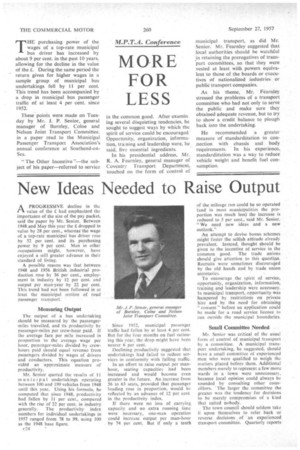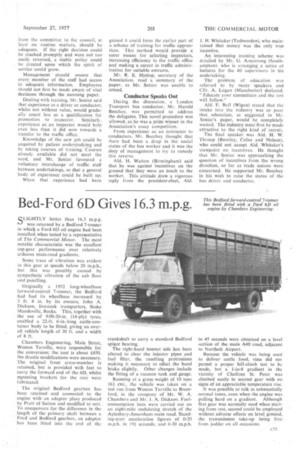New Ideas Needed to Raise Output
Page 62

Page 63

If you've noticed an error in this article please click here to report it so we can fix it.
1-1 A PROGRESSIVE decline in the value of the C had emphasized the importance of the size of the pay packet, said the paper by Mr. Senior. Between l948 and May this year the £ dropped in value by 28 per cent., whereas' the wage of a top-rate municipal bus driver rose by 52 per cent, and its purchasing power by 9 per cent. Men in other occupations might, however, have enjoyed a still greater advance in their standard of living.
A possible reason was that between 1948 and 1956 British industrial production rose by 36 per cent., employment in industry by 12 per cent and output per man-year by 22 per cent. This trend had not been followed in at least the municipal section of road passenger transport. Measuring Output
The output of a bus undertaking should be measured by the passengermiles travelled, and its productivity by passenger-miles per crew-hour paid. If the average fare per mile increased in proportion to the average wage per hour, passenger-miles divided by crewhours paid should equal revenue from passengers divided by wages of drivers and conductors. This equation providdd an approximate measure of productivity.
Mr. Senior quoted the results of 11 in un i ei pal undertakings operating between 100 and 199 vehicles from 1948 until this year. Using his formula, he computed that since 1948, productivity had fallen by 11 per cent., compared with the rise of 22 per cent, in industry generally. The productivity index numbers for individual undertakings in 1957 ranged from 78 to 99, using 100 as the 1948 base figure.
c24
Since 1952, municipal passenger traffic had fallen by at least 4 per cent. But for the four Months on fuel rationing this year, the drop might have been nearer 6 per cent.
Declining productivity suggested that undertakings had failed to reduce services in conformity with failing traffic.
In an effort to raise output per manhour, seating capacities had been increased and would become even greater in the future. An increase from 56 to 63 seats, provided that passenger loading rose in proportion, would be reflected by an advance of 12 per cent. in the productivity index.
If there were no loss of carrying capacity and no extra running time were necessary, one-man operation could increase output per man-hour by 74 per cent. But if only a tenth of the mileage run could be so operated (and in most municipalities the proportion was much less) the increase is reduced to 5 per cent., said Mr. Senior. "We need new ideas and a new outlook."
An attempt to devise bonus schemes might foster the selfish attitude already prevalent. Instead, thought should be given to the incentive of service in the common good. The trade unions should give attention to this question. Recruits were sometimes discouraged by the old hands and by trade union secretaries.
To encourage the spirit of service, opportunity, organization, information, training and leadership were necessary. In municipal transport, opportunity was hampered by restrictions on private hire and by the need for obtaining " consent " before an application could be made for a road service licence to run outside the municipal boundaries.
Small Committee Needed Mr. Senior was critical of the usual form of control of municipal transport by a committee. A municipal transport undertaking, he suggested, should have a small committee of experienced men who were qualified to weigh the matters placed before them. Additional members merely to represent a few more wards in a town were unnecessary, because local opinion could always be sounded by consulting other councillors. 'The larger the committee the greater was the tendency for decisions to he merely compromises of a kind that suited nobody.
The town council should seldom take it upon themselves to refer back or reverse decisions of an experienced transport committee. Quarterly reports from the committee to the council, at least on routine matters, should be adequate. If the right decision could be reached promptly and were not too easily reversed, a stable policy could be created upon which the spirit of service could grow.
Management should ensure that every member of the staff had access to adequate information. Employees should not first he made aware of vital decisions through the morning paper.
Dealing with training, Mr. Senior said that experience as a driver or conductor, whilst not without value, would gradually count less as a qualification for promotion to inspector. Similarly, experience as an inspector would help even less than it did now towards a transfer to the traffic office.
Knowledge of the new job could be acquired by patient understudying and by taking courses of training. Courses already available did not meet the need, and Mr. Senior favoured a voluntary interchange of traffic staff between undertakings, so that a general body of experience could be built up.
When that experience had been gained it could form the earlier part of a scheme of training for traffic apprentices. This method would provide a surer means for selecting inspectors, increasing efficiency in the traffic office and making a career in traffic administration for suitable entrants.
Mr. R. E. Hyslop, secretary of the Association, read a summary of the paper, as Mr. Senior was unable to attend.
Conductor Speaks Out
During the discussion, a London Transport bus conductor, Mr. Harold Beechey, was permitted to address the delegates. This novel procedure was allowed, as he was a prize winner in the Association's essay competition. • From experience as an instructor to conductors, Mr. Beechey thought that there had been a drop in the social status of the bus worker and it was the duty of management to try to remedy this reverse.
Aid. H. Watton (Birmingham) said that he was against incentives on the ground that they were an insult to the worker. This attitude drew a vigorous reply from the president-elect, Aid. J. H. Whitaker (Todmorden), who maintained that money was the only true incentive.
An interesting training scheme was detailed by Mr. G. Armstrong (Southampton), who is arranging a series of lectures for the 40 supervisors in his undertaking.
The problem of education was referred to by many speakers and Cllr. A. Logan (Manchester) declared: " Educate your committees and the rest will follow."
Aid. E. Ball (Wigan) stated that the intake into the industry was so poor that education, as suggested in Mr. Senior's paper, would be completely wasted. The industry must first be made attractive to the right kind of recruit.
The final speaker was Aid. H. W. Throup (Burnley, Colne and Nelson), who could not accept Aid. Whitaker's viewpoint on incentives. He thought that Mr. Senior was approaching the question of incentives from the wrong direction, so far as trade unions were concerned. He supported Mr. Beechey in his wish to raise the status of the bus driver and conductor.












































































































